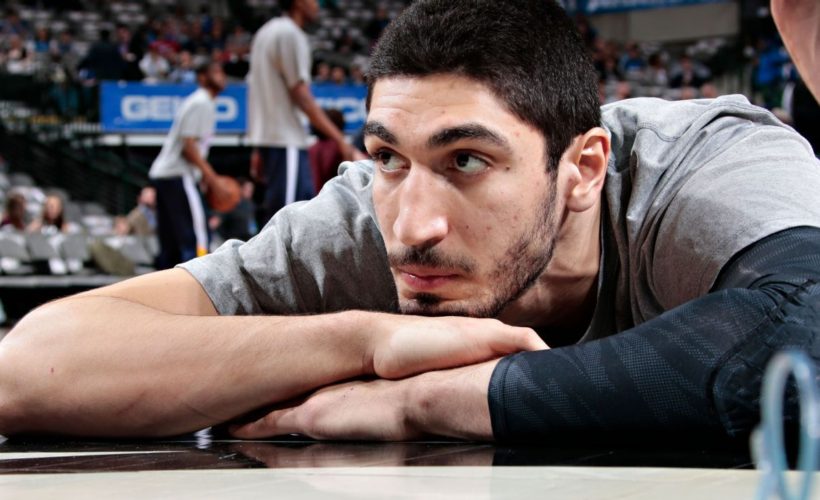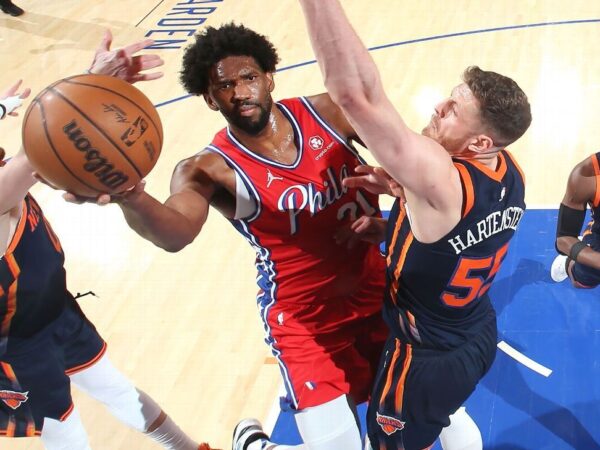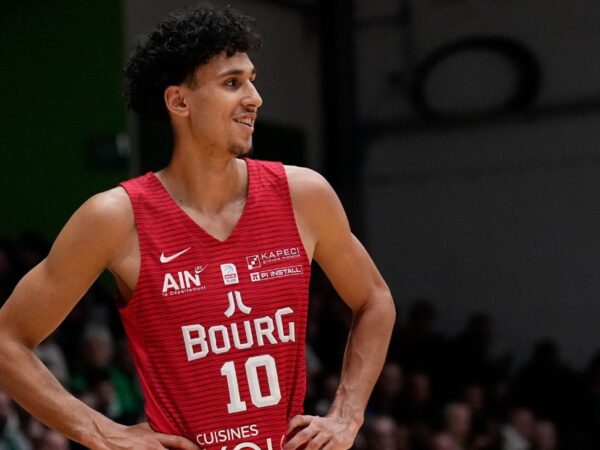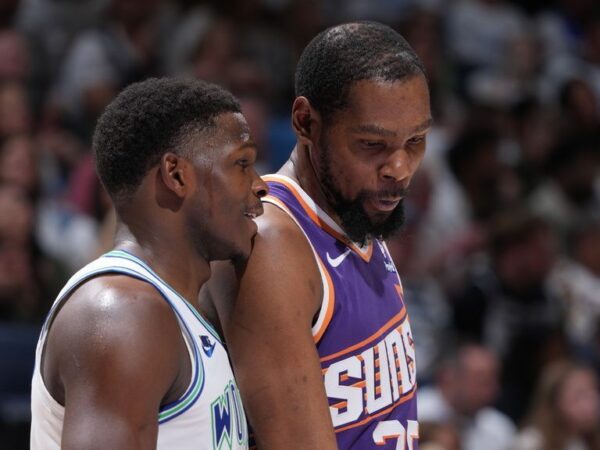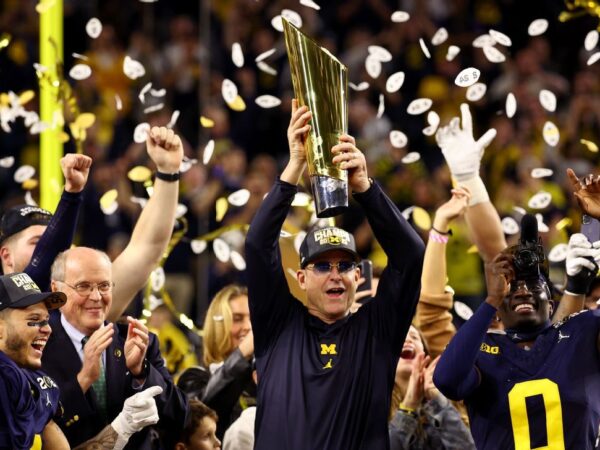ONE OF THE first items on Enes Kanter‘s schedule when he joined the Portland Trail Blazers in February was a meeting with agents from the local FBI office — just one among many ways Kanter’s life is vastly different from any other NBA player’s.
Kanter told the agents about the Interpol red notice that lists him as a wanted man and prohibits him from traveling safely outside the United States. He talked about the man he considers a dictator, Turkey’s president Reccip Tayyip Erdogan, and Erdogan’s near-pathological desire to see Kanter either imprisoned or dead. He showed them some of the death threats routinely directed his way.
Some of the threats are specific; most aren’t. Many of them originate on social media, bubbling up like methane through those fetid cesspits, creating skepticism. Do you take them seriously? is the question Kanter gets most often, and one of the few things with the power to exasperate him. “I’ve got to,” he answers. “Wouldn’t you?” This is not, Kanter says, the same as ignoring someone who criticizes his defense or disagrees with an opinion. “You never know,” he says. “What if the one I ignore is a lone wolf or just some crazy dude that tries to do something?”
(To be fair, perhaps it’s Kanter’s delivery that defuses concern. He speaks of the threats, like all the major events of his recent past — the four years he has been unable to speak to his parents and sister in Turkey, for example — as if he’s reciting details from somebody else’s life. He talks about posting a possibly futile Mother’s Day message — “I don’t think there’s any chance she could see it,” he says — with a resigned smile. “All the pain lives inside you,” he says, “but you can’t show it on the outside.”)
He told the FBI agents that Erdogan revoked his passport in 2017 and last year used a Turkish court to indict him on a terrorism charge related to his public dissent and devotion to exiled Turkish cleric and Erdogan critic Fethullah Gulen, whom the Turkish government accuses of masterminding a failed coup in 2016 and whom Kanter visited every two weeks at Gulen’s Pennsylvania compound while Kanter was playing for the New York Knicks. He explained how the death threats accelerated earlier this season, when he was unable to travel to London with New York. He mentioned how difficult it is to deal with the threats when your work schedule can be found with only a few keystrokes by anyone in the world.
And he told them, as an addendum to a question that wasn’t asked, that he has no plans to stop his outspoken defiance against the leader of his home country.
“I have a voice,” he says, “and I’m trying to use it to be the voice for all the innocent people who don’t have one.”
He says the agents listened and wrote down Kanter’s words and asked a few more questions. Not once did they ask if he was taking the threats seriously, and before they left, they installed a device next to his bed. “If you’re uncomfortable with anything, just push that button,” they told him. “If you hear something you don’t like or have a reason to believe there’s a threat, push the button and someone will be here within minutes.”
And so Enes Kanter goes to sleep every night and wakes up every morning with tangible proof of his own mortality — and others’ possible designs on it — less than an arm’s length away. This, too, Kanter relays dispassionately, as if a bedside-table panic button connected to law enforcement is simply one more modern amenity, like a high-tech thermostat. He has learned to accept the absurd as normal.
THE WESTERN CONFERENCE finals haven’t gone the way Kanter and the Blazers hoped. They are down three games to none, and Kanter’s role has diminished with each game. He no longer starts, and he played just seven minutes in Game 3 on Saturday. As decreed by the Turkish government, the games are not being shown on the national sports network, so he imagines his family having to “go to some weird website and break a VPN code to watch.”
None of what has happened on the court is especially newsworthy in its own right — the Golden State Warriors are far superior, and they have a habit of making 7-footers who can’t guard the pick-and-roll look oafish — but the Blazers’ inevitable defeat does remove what could have been an unprecedented situation. If the Blazers and the Toronto Raptors played in the NBA Finals, Kanter would have faced a remarkable choice: either play only the home games in a championship series or risk international arrest by traveling outside the United States. It’s not a stretch to say it could have been — or still could be — a life-or-death decision.
The Interpol red notice, defined as an international “wanted person’s notice” and not an arrest warrant, looms like a massive balloon payment. (Because of it, the Blazers opted against taking Kanter to Toronto on March 1.) Oregon Sen. Ron Wyden, a 6-foot-4 former basketball player at UC Santa Barbara, wrote a letter to Canadian Prime Minister Justin Trudeau, asking for Canada to ensure Kanter’s safe passage in and out of the country. Since he joined the Blazers, Kanter and Wyden have become friends; Wyden took Kanter’s case not only to Trudeau but to the floor of the Senate, where he warned Erdogan, through the vast but underwatched reach of C-SPAN, that America was paying attention to the “show trial” planned in April for Kanter’s father. Since then, Kanter says, the trial was postponed to at least June. He calls the Democratic senator “a friend, and a really cool guy.”
During dinner at a restaurant inside Moda Center before Game 3, Wyden explains what drew him to Kanter.
“What Enes is doing that is so important is saying, ‘I’m an athlete, I’m visible. I can speak for freedom. I can speak for human dignity. I have a voice that all these suffering people in my country don’t have.’ And he is doing all of this at great risk to himself. He is articulating his human-rights position with dignity, with facts, with compassion for others who can’t be heard the way a professional athlete can. Erdogan, in my view, is a textbook bully. He subscribes to the idea that he can intimidate Enes any way he can.
“And there is no question that this cumulatively weighs very heavily on Enes. Think about what he’s gone through: He’s got to go to bed at night thinking that one of the world’s most powerful dictators doesn’t want him around.”
Wyden pauses to emphasize the permanence of what he’s suggesting.
“Erdogan doesn’t want Enes around. Period. Full stop.”
As a response to the failed coup, the BBC estimated last year that more than 50,000 people have been jailed and more than 100,000 were dismissed from public-sector jobs. Erdogan blames the attempted coup on Gulen, whom Kanter says “taught me that it doesn’t matter your religion, your color, your background — whatever — we need to leave all our differences on the table and find what we have in common. One thing people don’t understand: My problem is not with my country. I love my country. I love my people. My problem is with the regime, and the government of Turkey.”
Kanter’s teammates don’t know about the panic button. They don’t hear much about the death threats or his detachment from his family. The idea that a teammate could be a sworn enemy of a world leader is relatable only in the abstract.
“He doesn’t talk about it much,” says Blazer forward Jake Layman, one of Kanter’s closer friends on the team. “He tries to keep that to a minimum. I’ve heard it’s not pretty, and I’ve heard that it’s serious stuff. I think the way he’s handled it has been amazing. Fighting for his country every chance he gets — it’s very inspiring to see how much he goes through to fight for what he believes in.”
KANTER IS NOT only playing in the Western Conference finals and dealing with the geopolitical ramifications of his outspokenness. He is also a devout Muslim observing Ramadan.
On a typical day, he awakens at 3 a.m. to eat as much as possible before sunrise. He goes back to sleep and cannot eat or drink anything — not even water — until sunset. By 5 p.m. on a game day, as he goes through his pregame routine on the court, he has not put anything in his body for 14 hours. He averaged more than 30 minutes in the four games in Denver in the Western Conference semifinals, at altitude, without breaking his fast. The water boys, unaware of his situation, offered him water at every break.
“Every time out — ‘No, I’m good,’ ‘No, I’m fine,'” Kanter says. “They’re thinking, ‘What’s wrong with this guy?'”
After Game 1 in Oakland, Kanter checked the clock: 8:18. Sunset was 10 minutes away, so he gathered as much food and drink as possible — several salmon fillets, a mountain of pasta, a small ocean of water and Gatorade — and ate it all on the bus ride back to the hotel. And then, once he got there, he called room service and ate nearly as much once again. One of the semifinal games started after sundown, and Kanter ate six peanut-butter-and-jelly sandwiches before tipoff. “My teammates were sure I was going to throw up,” he says, laughing.
His adherence to the rules of Ramadan is the quick-and-easy Kanter story of the postseason, but given everything happening in his life, fasting is a minor annoyance. One of the world’s most notorious strongmen wants to impose his idea of justice upon him, and yet he keeps talking. His words could endanger his parents and sister in Turkey, and yet he keeps talking. His words — he once called Erdogan “the Hitler of our time” — are the reason he can’t leave the country and can’t communicate with his family and can’t ignore the death threats. His words are the reason his father publicly denounced him — Enes is convinced his father’s words were written under duress — and yet he keeps talking.
“I will never stop talking,” he says. He laughs again, at the absurdity of that statement, and the need to employ it. “I understand my mother and father and sister are in Turkey, but if I stop talking, who is going to speak for the thousands and thousands of innocent people in jail? People are getting tortured and killed, so I have to talk about these issues. I’m not a journalist or a politician, so this is my platform.”
The tone and the delivery are pleasant, almost giddy. Kanter has a voice that carries through a room, and a face — with its Cubist angles and intensely manicured facial hair — made for a grooming ad. He is standing on the side of a basketball court in San Francisco, and practice will start in minutes. “Basketball is my escape,” he says, “and I cannot bring any of my problems onto the court. But after I leave the court, the fight begins.”
He knows what he’s risking, and how seriously some people take his defiance. When he goes to bed at night or wakes up in the morning, the reminder is never more than an arm’s length away.
Source:ESPN

